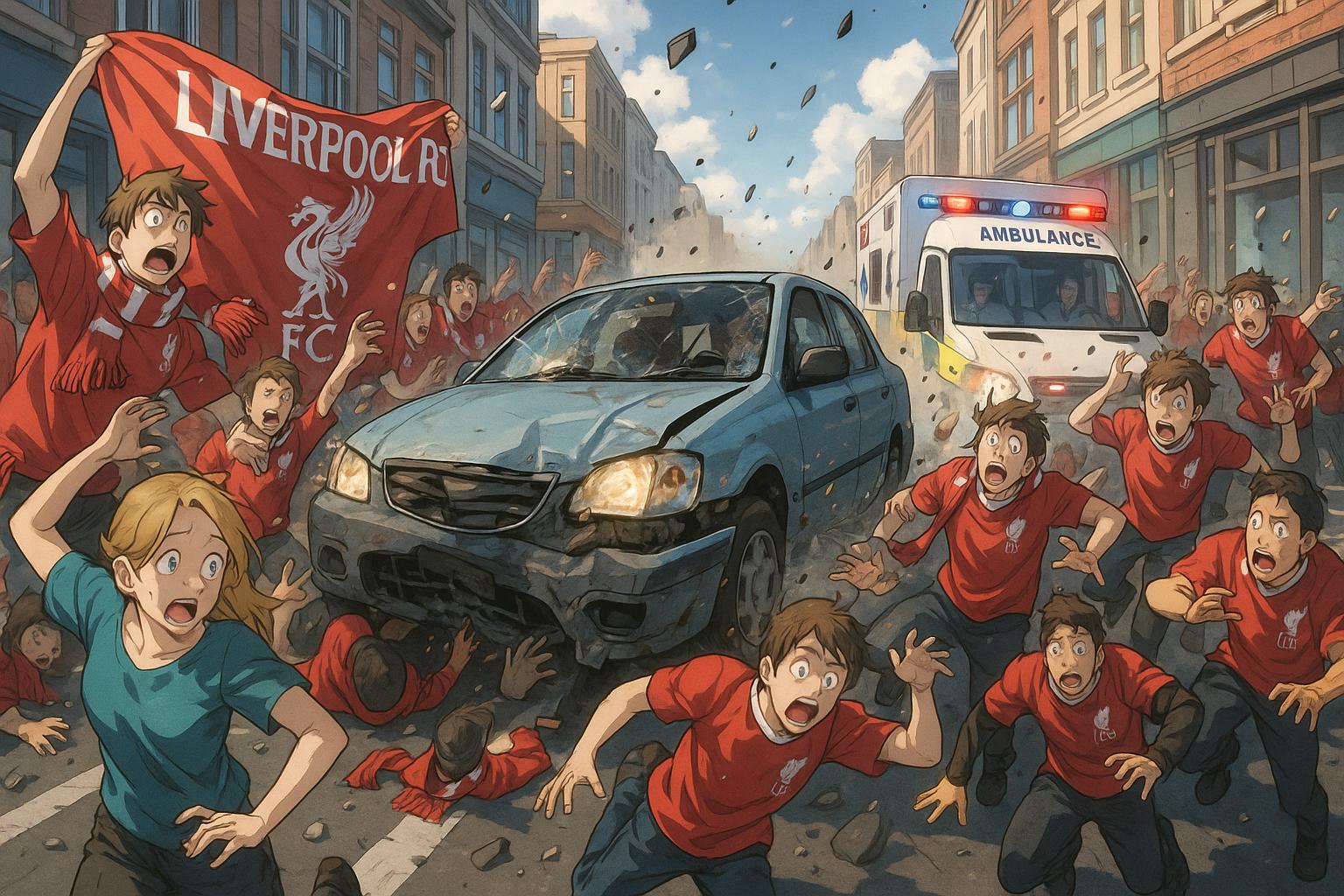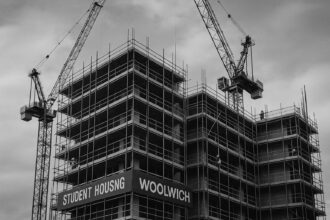A vehicle rammed into a crowd celebrating Liverpool FC’s Premier League win, injuring nearly 80 people. Police arrested a 53-year-old suspect for attempted murder and are deepening the investigation, as the city mourns and demands justice amid a wider debate sparked by controversial comedy remarks.
Following the recent celebrations of Liverpool FC’s Premier League victory, the city was rocked by a tragic incident that marred what was meant to be a night of jubilation. A vehicle ploughed into a crowd of fans on Water Street, injuring nearly 80 people, in an event that was initially perceived as a joyous occasion celebrating the team’s success.
The shocking incident unfolded on Monday evening, shortly after the team’s open-top bus parade concluded. Reports indicate that the 53-year-old suspect managed to evade a roadblock established for the celebration by tailing an ambulance responding to a separate emergency. Witnesses described the chaotic scene as the vehicle sped into a densely packed gathering, causing panic and confusion. Eyewitness accounts reveal that emergency services acted swiftly, with rescue teams attending to those trapped beneath the vehicle’s wheels, including children.
In the aftermath of the incident, the perpetrator was arrested on suspicion of attempted murder, dangerous driving, and driving under the influence of drugs. The Merseyside Police confirmed that the case is not being treated as a terrorism-related act, instead describing it as an isolated event. In light of the grievous circumstances, seven individuals were reported to be hospitalised in stable condition, and the police have extended their questioning of the suspect beyond the usual 48 hours, deepening the investigation into the intentions behind this reckless act.
Prime Minister Keir Starmer visited Liverpool shortly after the incident, expressing his condolences to those affected and condemning the actions that disrupted a moment of collective pride for the city. The sentiments were echoed by Home Secretary Yvette Cooper, who met with emergency responders on-site, reinforcing the need for a thorough investigation. Notably, the tragedy stirred echoes of previous historical events, reminding the community of experiences such as the Hillsborough disaster of 1989, which had long-lasting impacts on the city and its football culture.
As the inquiry progresses, the comedy scene has also faced turbulence due to remarks made by comedian Andrew Lawrence, whose show was cancelled following his controversial commentary on social media regarding the incident. Lawrence’s post, which many deemed in poor taste, sparked outrage, leading Caddies Southend to cancel his upcoming performance. In his response to the venue’s decision, Lawrence claimed they lacked “courage,” a statement that only added fuel to the already heated conversation around the appropriateness of humour in the wake of tragedy.
Amidst the stir of opinions, the broader implications of the incident highlight a critical moment for Liverpool. The community, already resilient in the face of hardship, is now confronted with a stark reminder of the challenges that can arise during public celebrations. Collectively, the city will undoubtedly navigate this crisis as they have many before, seeking both justice for the victims and healing for the community as they move forward.
Reference Map:
- Paragraph 1 – [1], [2], [5]
- Paragraph 2 – [3], [4], [6]
- Paragraph 3 – [4], [5], [6]
- Paragraph 4 – [1], [7]
Source: Noah Wire Services
- https://www.liverpoolecho.co.uk/news/liverpool-news/city-centre-live-updates-emergency-31727936 – Please view link – unable to able to access data
- https://www.apnews.com/article/336d6ed8b8c25d94a435f80e533b9ccf – A 53-year-old British man remains in custody after being arrested on suspicion of attempted murder following a vehicle collision that injured nearly 80 people during a Liverpool soccer championship celebration. The incident occurred on Monday in Liverpool city center when a car was driven into a crowd of fans celebrating Liverpool’s 20th Premier League title. The street had been closed for the event, and it is alleged the suspect bypassed a roadblock by following an ambulance responding to a medical emergency. Initially, the number of injured was lower, but police updated the count as more victims came forward. Seven individuals remain hospitalized in stable condition. Authorities have received court approval to extend the suspect’s detention beyond the standard 48 hours and must decide whether to charge or release him by Thursday evening. Prime Minister Keir Starmer visited Liverpool to meet with police and the city’s mayor, condemning the tragic turn of events that marred what was meant to be a joyful celebration.
- https://www.axios.com/2025/05/28/uk-liverpool-parade-car-crash-attempted-murder-arrest – A man has been arrested on suspicion of attempted murder after driving a car into a crowd during the Liverpool soccer team’s victory parade in northwest England. The incident occurred on Monday and resulted in injuries to 65 people who had gathered to celebrate the team’s win of the English Premier League trophy. According to British police, the crash is not being treated as a terrorist act. The suspect is also facing charges of dangerous driving and driving under the influence of drugs. The arrest was confirmed by Merseyside Police Detective Chief Superintendent Karen Jaundrill during a briefing on Tuesday.
- https://www.reuters.com/sports/soccer/uk-police-given-more-time-question-liverpool-parade-crash-suspect-2025-05-28/ – British police have received an extension to continue questioning a 53-year-old man arrested in connection with a vehicle incident during a soccer parade in Liverpool. On Monday, the suspect allegedly drove a car into a crowd of soccer fans, resulting in multiple injuries. According to Merseyside Police, the man will remain in custody until at least Thursday while investigations proceed. Seven individuals remain hospitalized in stable condition following the crash. Authorities are actively investigating the motive and circumstances surrounding the incident.
- https://www.ft.com/content/bac188a4-2157-4201-8c3b-9b1e3128da7b – A 53-year-old man from West Derby has been arrested on suspicion of attempted murder, dangerous driving, and driving under the influence of drugs after a vehicle struck a crowd during Liverpool Football Club’s Premier League victory parade on Monday evening. The Ford Galaxy car reportedly passed through a temporary roadblock behind an ambulance and then collided with pedestrians around 6pm, resulting in 65 casualties. Of these, 50 required hospital treatment, and 11 remain hospitalized in stable condition. Merseyside Police emphasized that the incident is not being treated as terrorism and urged the public not to speculate online. CCTV footage is being reviewed to track the vehicle’s movements leading up to the crash. Emergency responders, including Merseyside Fire and Rescue Service, rescued four people—among them a child—trapped beneath the vehicle. The event was concluding when the incident occurred, despite extensive road closures and a traffic management plan. Home Secretary Yvette Cooper visited the site and met responders, while expressions of sympathy came from the Prince and Princess of Wales and King Charles and Queen Camilla, who called the event deeply shocking and saddening.
- https://time.com/7288755/liverpool-car-ramming-dozens-injured-explainer/ – On May 26, 2025, a vehicle rammed into a crowd in downtown Liverpool, England, during celebrations of Liverpool F.C.’s English Premier League victory. The incident injured 47 people, including four children, with four individuals reported to be in critical condition. Around one million fans were present when the car drove into the crowd on Water Street at approximately 6 p.m. local time. Eyewitnesses reported chaotic scenes as people tried to stop the vehicle before police apprehended it. A 53-year-old white British man, believed to be the driver, was arrested. Authorities have stated the incident is not being treated as terrorism and is considered isolated. Emergency services responded rapidly, rescuing four people trapped beneath the vehicle and transporting 27 people to the hospital. The incident sparked concern due to recent similar global car-ramming attacks, though police and officials were praised for their swift action and communication, preventing the spread of misinformation. This contrasts with a previous incident in July 2024, where delays in official response led to widespread speculation and unrest.
- https://www.huffingtonpost.es/global/atropello-multiple-celebracion-liverpoolbr.html – Un trágico atropello múltiple ocurrió el lunes 26 de mayo de 2025 en Water Street, Liverpool, durante la celebración del título de la Premier League por parte del Liverpool FC. Un hombre británico de 53 años, vecino de la ciudad, irrumpió con su coche en una zona abarrotada de aficionados, dejando un saldo de 47 heridos, 27 hospitalizados, incluidos cuatro menores, y dos personas en estado grave. La Policía ha descartado que se trate de un atentado terrorista y considera el incidente como un hecho aislado. El conductor fue detenido inmediatamente tras el impacto. Testigos relatan escenas de pánico y caos mientras el vehículo avanzaba sin frenar, hasta detenerse después de recorrer unos 20 metros. Los equipos de emergencia rescataron a cuatro personas, incluyendo un niño, que quedaron atrapadas bajo el vehículo. Autoridades como el primer ministro Keir Starmer y el Ministerio del Interior han expresado su pesar, mientras que el Liverpool FC y la Premier League han mostrado apoyo a los afectados. Este evento empaña una celebración que debía ser festiva y remueve recuerdos de la tragedia de Hillsborough de 1989, en la que murieron 97 aficionados del club.













